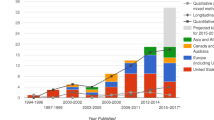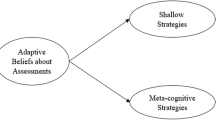Abstract
Purpose
Self-efficacy, academic motivation, and self-regulation have been identified as important factors contributing to students’ learning success in general education. In the field of medical education, however, few studies have examined these variables or their interrelationships as predictors of undergraduate medical students’ learning outcomes, especially in the context of flipped learning.
Methods
Using structural equation modeling (SEM), this study explored the impact of self-efficacy on 146 first- and second-year medical students’ academic achievement in a flipped-learning environment, and whether such impact (if any) was mediated by academic motivation and self-regulated learning (SRL) strategies.
Results
On average, students scored highest on self-efficacy (mean = 5 out of a possible 7), followed by intrinsic motivation (mean = 4.59), resource-management strategies (mean = 4.48), metacognitive strategies (mean = 4.46), extrinsic motivation (mean = 4.24), and cognitive strategies (mean = 4.17). Our SEM results suggest that, while there was a direct effect of self-efficacy on learning outcomes, academic motivation and SRL strategies did not mediate it.
Conclusions
By unpacking the structural relationships among self-efficacy, academic motivation, SRL strategies, and learning outcomes, this study provides evidence-based support for the importance of promoting students’ self-efficacy in undergraduate medical flipped-learning environments. Strategies for increasing students’ self-efficacy are also discussed.

Similar content being viewed by others
Data Availability
Upon request
References
Stegers-Jager KM, Cohen-Schotanus J, Themmen APN. Motivation, learning strategies, participation and medical school performance. Med Educ. 2012;46:678–88. https://doi.org/10.1111/j.1365-2923.2012.04284.x.
Klassen RM, Klassen JRL. Self-efficacy beliefs of medical students: a critical review. Perspect Med Educ. 2018;7:76–82. https://doi.org/10.1007/s40037-018-0411-3.
Burgoon JM, Meece JL, Granger NA. Self-efficacy’s influence on student academic achievement in the medical anatomy curriculum. Anat Sci Educ. 2012;5:249–55. https://doi.org/10.1002/ase.1283.
Brydges R, Butler D. A reflective analysis of medical education research on self-regulation in learning and practice. Med Educ. 2012;46:71–9. https://doi.org/10.1111/j.1365-2923.2011.04100.x.
Patel R, Green W, Shahzad MW, Church H, Sandars J. Using a self-regulated learning-enhanced video feedback educational intervention to improve junior doctor prescribing. Med Teach. 2020;42:1–10. https://doi.org/10.1080/0142159X.2020.1748183.
Demirören M, Turan S, Öztuna D. Medical students’ self-efficacy in problem-based learning and its relationship with self-regulated learning. Med Educ Online. 2016;21:30049. https://doi.org/10.3402/meo.v21.30049.
Wang Y-H, Kao P-F, Liao H-C. The relationship of vocabulary learning strategies and self-efficacy with medical English and terminology. Percept Mot Skills. 2016;122:47–66. https://doi.org/10.1177/0031512516628377.
Bandura A. The explanatory and predictive scope of self-efficacy theory. J Soc Clin Psychol. 1986;4:359–73. https://doi.org/10.1521/jscp.1986.4.3.359.
Richardson M, Abraham C, Bond R. Psychological correlates of university students’ academic performance: a systematic review and meta-analysis. Psychol Bull. 2012;138:353–87. https://doi.org/10.1037/a0026838.
Tiyuri A, Saberi B, Miri M, Shahrestanaki E, Bayat BB, Salehiniya H. Research self-efficacy and its relationship with academic performance in postgraduate students of Tehran University of Medical Sciences in 2016. J Educ Health Promot. 2018;7:11. https://doi.org/10.4103/jehp.jehp_43_17.
Motlagh SE, Amrai K, Yazdani MJ, Abderahim H a, Souri H. The relationship between self-efficacy and academic achievement in high school students. Procedia - Soc Behav Sci. 2011;15:765–8. https://doi.org/10.1016/j.sbspro.2011.03.180.
Multon KD, Brown SD, Lent RW. Relation of self-efficacy beliefs to academic outcomes: a meta-analytic investigation. J Couns Psychol. 1991;38:30–8. https://doi.org/10.1037/0022-0167.38.1.30.
Zimmerman BJ, Bandura A, Martinez-Pons M. Self-motivation for academic attainment: the role of self-efficacy beliefs and personal goal setting. Am Educ Res J. 1992;29:663–76. https://doi.org/10.3102/00028312029003663.
Yusuf M. The impact of self-efficacy, achievement motivation, and self-regulated learning strategies on students’ academic achievement. Procedia - Soc Behav Sci. 2011;15:2623–6. https://doi.org/10.1016/j.sbspro.2011.04.158.
Moulaert V, Verwijnen MGM, Rikers R, Scherpbier AJJA. The effects of deliberate practice in undergraduate medical education. Med Educ. 2004;38:1044–52. https://doi.org/10.1111/j.1365-2929.2004.01954.x.
Sobral DT. What kind of motivation drives medical students’ learning quests? Med Educ. 2004;38:950–7. https://doi.org/10.1111/j.1365-2929.2004.01913.x.
Deci EL, Ryan RM. A motivational approach to self: integration in personality. Neb Symp Motiv Neb Symp Motiv. 1990;38:237–88.
Ryan RM, Deci EL. Intrinsic and extrinsic motivations: classic definitions and new directions. Contemp Educ Psychol. 2000;25:54–67. https://doi.org/10.1006/ceps.1999.1020.
Kusurkar RA, Croiset G, Galindo-Garré F, Ten Cate O. Motivational profiles of medical students: association with study effort, academic performance and exhaustion. BMC Med Educ. 2013;13. https://doi.org/10.1186/1472-6920-13-87.
Zimmerman BJ. Becoming a self-regulated learner: which are the key subprocesses? Contemp Educ Psychol. 1986;11:307–13. https://doi.org/10.1016/0361-476X(86)90027-5.
Zimmerman BJ. Attaining self-regulation: a social cognitive perspective. Handb. Self-Regul. San Diego: Academic Press; 2000. p. 13–39.
Hattie J. Visible learning: a synthesis of over 800 meta-analyses relating to achievement. Abingdon: Routledge; 2009.
Durning SJ, Cleary TJ, Sandars J, Hemmer P, Kokotailo P, Artino AR. Perspective: viewing “strugglers” through a different lens: how a self-regulated learning perspective can help medical educators with assessment and remediation. Acad Med J Assoc Am Med Coll. 2011;86:488–95. https://doi.org/10.1097/ACM.0b013e31820dc384.
White CB, Gruppen LD, Fantone JC. Self-regulated learning in medical education. In: Tim S, editor. Understanding Medical Education, John Wiley & Sons, Ltd; 2013, p. 201–11. https://doi.org/10.1002/9781118472361.ch15.
Zimmerman BJ. Investigating self-regulation and motivation: historical background, methodological developments, and future prospects. Am Educ Res J. 2008;45:166–83. https://doi.org/10.3102/0002831207312909.
Zumbrunn S, Tadlock J, Roberts ED. Encourage self regulated learning in the classroom: A review of the literature. Metropolitan Educational Research Consortium (MERC); 2011
Pintrich PR, Smith DA, Garcia T, McKeachie WJ. A manual for the use of the motivated strategies for learning questionnaire (MSLQ). Ann Arbor, MI: National Center for Research to Improve Postsecondary Teaching and Learning; 1991
Vallerand RJ, Pelletier LG, Blais MR, Briere NM, Senecal C, Vallieres EF. The academic motivation scale: a measure of intrinsic, extrinsic, and amotivation in education. Educ Psychol Meas. 1992;52:1003–17. https://doi.org/10.1177/0013164492052004025.
Hair JF, Black WC, Babin BJ, Anderson RE. Multivariate data analysis. 7th ed. Pearson: London; 2014.
Muthén LK, Muthén BO. Mplus user’s guide. 6th ed. Los Angeles: Muthén & Muthén; 2007.
Bentler PM, Chou C-P. Practical issues in structural modeling. Sociol Methods Res. 1987;16:78–117. https://doi.org/10.1177/0049124187016001004.
MacCallum RC, Browne MW, Sugawara HM. Power analysis and determination of sample size for covariance structure modeling. Psychol Methods. 1996;1:130–49. https://doi.org/10.1016/S1726-4901(09)70399-5.
Doménech-Betoret F, Abellán-Roselló L, Gómez-Artiga A. Self-efficacy, satisfaction, and academic achievement: the mediator role of students’ expectancy-value beliefs. Front Psychol. 2017;8:1193. https://doi.org/10.3389/fpsyg.2017.01193.
Schunk DH, Meece JL, Pintrich PR. Motivation in Education: Theory, Research, and Applications. London, UK: Pearson; 2014
Bierer SB, Dannefer EF. The learning environment counts: longitudinal qualitative analysis of study strategies adopted by first-year medical students in a competency-based educational program. Acad Med. 2016;91:S44–52. https://doi.org/10.1097/ACM.0000000000001363.
ten Cate O, Kusurkar RA, Williams GC. How self-determination theory can assist our understanding of the teaching and learning processes in medical education. AMEE guide no. 59. Med Teach. 2011;33:961–73. https://doi.org/10.3109/0142159X.2011.595435.
ten cate O, Durning S. Peer teaching in medical education: twelve reasons to move from theory to practice. Med Teach. 2007;29:591–9. https://doi.org/10.1080/01421590701606799.
van Eyk HJ, Hooiveld MHW, Van Leeuwen TN, Van der Wurff BLJ, De Craen AJM, Dekker FW, et al. Scientific output of Dutch medical students. Med Teach. 2010;32:231–5. https://doi.org/10.3109/01421591003596592.
Pintrich PR. A conceptual framework for assessing motivation and self-regulated learning in college students. Educ Psychol Rev. 2004;16:385–407.
Sandars J, Cleary TJ. Self-regulation theory: applications to medical education: AMEE guide no. 58. Med Teach. 2011;33:875–86. https://doi.org/10.3109/0142159X.2011.595434.
Wolters CA. Regulation of motivation: evaluating an underemphasized aspect of self-regulated learning. Educ Psychol. 2003;38:189–205. https://doi.org/10.1207/S15326985EP3804_1.
West C, Sadoski M. Do study strategies predict academic performance in medical school? Med Educ. 2011;45:696–703. https://doi.org/10.1111/j.1365-2923.2011.03929.x.
Lapp H, Makowka P, Recker F. Peer-mentoring program during the preclinical years of medical School at Bonn University: a project description. GMS J Med Educ. 2018;35. https://doi.org/10.3205/zma001154.
Author information
Authors and Affiliations
Contributions
BZ has contributed to study design, data collection, data analysis, drafting, and finalization of the manuscript. CC contributed to data analysis, drafting, and finalization of the manuscript. CL contributed to data analysis, drafting, and finalization of the manuscript. YZ contributed to data collection, drafting, and finalization of the manuscript.
Corresponding author
Ethics declarations
Conflict of Interest
The authors declare that they have no conflict of interest.
Code Availability
Not applicable
Additional information
Publisher’s Note
Springer Nature remains neutral with regard to jurisdictional claims in published maps and institutional affiliations.
Rights and permissions
About this article
Cite this article
Zheng, B., Chang, C., Lin, CH. et al. Self-Efficacy, Academic Motivation, and Self-Regulation: How Do They Predict Academic Achievement for Medical Students?. Med.Sci.Educ. 31, 125–130 (2021). https://doi.org/10.1007/s40670-020-01143-4
Accepted:
Published:
Issue Date:
DOI: https://doi.org/10.1007/s40670-020-01143-4




